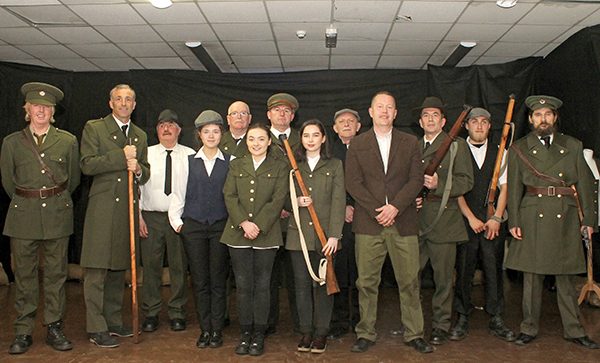
Pictured: The cast of ‘25 to Clanwilliam’.
The Battle of Mount Street Bridge has only recently been recognised as one of the bravest and bloodiest engagements of the 1916 Rising amongst the general public, although it has long been acknowledged as such by the residents of Ringsend and Irishtown, as many have family members who took part in it.
The position of the Bridge on the route from Kingstown (Dun Laoghaire) where British army reinforcements would disembark, to Dublin city centre where the central drama of the Rising was concentrated, ensured that it would be a flash point between the forces defending the newly proclaimed Republic and the forces of the British Crown.
Well in advance of the planned uprising, Eamonn de Valera, Commandant of the 3rd Battalion, and Lieutenant Michael Malone had identified strategic sites in the area where an ambush could be staged.
It was the Volunteers located at these two positions that playwright Anthony O’Reardon chose to focus on when writing his debut play. The title is a play on the addresses of two of the sites where the fighting took place, 25 Northumberland Road and Clanwilliam House, which is located by the Grand Canal in Clanwilliam Place.
Rather than repeat the familiar story of The Battle of Mount Street Bridge, O’Reardon set out to convey a sense of the mood and motivation of the men who participated in this dangerous mission and in doing so to present the story from a unique perspective. He drew on archived testimonials and witness statements from the survivors, in particular the stark and descriptive testimony of Seamus Grace who fought alongside Michael Malone in 25 Northumberland Road.
‘25 to Clanwilliam’ more than fulfils its remit. As the characters interact on stage they communicate the bravery of the men and the excitement they feel, knowing that they are part of history in the making.
This bravery is underscored by the fears they express as the battle rages about them, knowing that this will be a battle to the death for some of them. Nevertheless they feel it is worth it. They cannot accept the Home Rule option knowing that there are 20,000 armed Unionists in the North of Ireland preparing to resist it.
They set aside their fears and their reservations about killing enemy combatants. They convey some empathy for the young recruits from the Nottingham Foresters who are on the receiving end of their sniper fire but as the play makes clear; this is not personal, this was war. In spite of the confusion caused by countermanding orders from Headquarters and the failure of arms from Germany to arrive, they will fight on until they no longer can.
The play was presented by The South Dock 16 Society and performed for the first time in Ringsend College on April 27th, one-hundred years and a day from when the action took place.
A newly-established group of actors, The Volunteers, came together to bring the story to the public after the playwright put out a call on social media and through local community organisations for actors with some or no acting experience to participate. All of those who answered the call had a keen interest in history and a respect for the men of the 3rd battalion.
Although a couple of the cast members are experienced actors, most had no acting experience but they worked hard over seven weeks of rehearsals to bring the story to the stage to do justice to these heroes of 1916.
It would be unfair to single out any individual for special mention although the two youngest members of the company, 16 year old Ellen Russell and 17 year old Michelle Ward, who play the parts of May Cullen and Brigid Grace respectively, gave fine word-perfect performances, which augers well for their future acting ambitions.
All of the actors gave assured performances on the night, convincingly inhabiting the characters that they portrayed. Over the weeks of preparation they enjoyed the process of being part of this unique production. Their hard work was rewarded by the enthusiastic reaction of the audience, which included family members of some of the characters being portrayed on stage.
NewsFour predicts that this will not be their only production as a group. Already, the volunteers have been invited to present what was to have been a one-off performance in other venues, including a trip to Portarlington to perform for the family of Michael Malone.
NewsFour recommends that readers who have an opportunity to catch a performance should, as ‘25 to Clanwilliam’ finally gives the men of the 3rd Battalion the respect and acknowledgement that is long overdue.
By Jennifer Reddin



